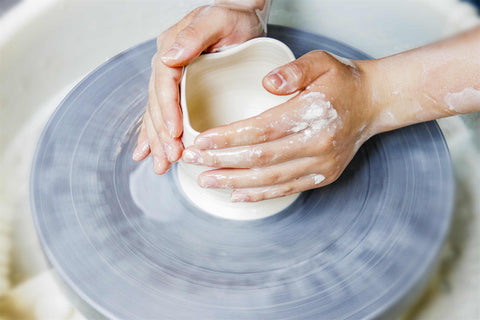A Comparative between Handmade and Industrial Ceramics
Share
Humanization and Sensation
Handmade Ceramics: The artisan's dedication and the meticulous handcrafting process breathe a distinct human quality into handmade ceramics. Moreover, the surface of these creations often invites a delicate tactile sensation, establishing a profound connection between the piece and its beholder.
Machine-made Ceramics: While ceramics crafted by machines boast a uniform surface, they may lack the unique touch and texture inherent in handmade products. The absence of human hands in the production process can render these items less emotionally resonant and tactile.
Artistry and Creativity
Handmade Ceramics: The creation of handmade ceramics is a testament to the artist's ingenuity and skill. Manual techniques open avenues for diverse textures, shapes, and decorative effects. Artists, guided by their creativity, can explore various glazes, resulting in a mesmerizing spectrum of unique colors and visual allure.
Machine-made Ceramics: Constrained by fixed design and manufacturing processes, machine-made ceramics often fall short in capturing the artistic finesse found in handmade pieces. The use of standardized glazes limits the potential for rich artistic effects and intricate textures, contributing to a more predictable visual outcome. Machine production, by its nature, adheres to standardized processes, potentially hindering diversity and innovation.
Personalized Customization
Handmade Ceramics: A distinctive aspect of handmade ceramics lies in the personalized connection forged between creator and customer. This dynamic interaction allows customers to engage with the artist, expressing their preferences and requesting customized designs, shapes, or colors tailored to individual tastes.
Machine-made Ceramics: In contrast to the bespoke experience offered by handmade ceramics, machine-made counterparts grapple with challenges in personalized customization. Production lines, optimized for large-scale standardization, face limitations in accommodating the nuanced preferences of individual customers. The result is a product that, while efficient, may lack the unique touch of a personally tailored creation.
In the delicate interplay between human touch and industrial precision, handmade and machine-made ceramics emerge as distinct expressions of artistry, each with its own set of virtues and limitations. The former, a celebration of the artisan's dedication and creativity, while the latter, an embodiment of efficiency albeit at the expense of personalized, artistic nuances.







